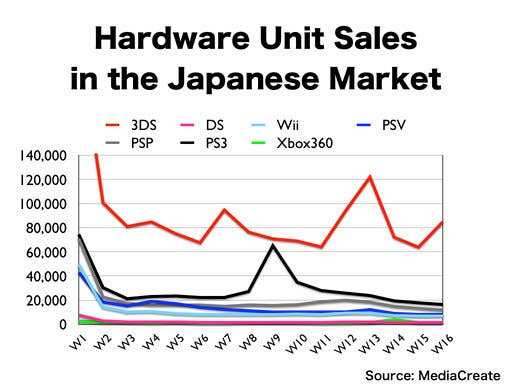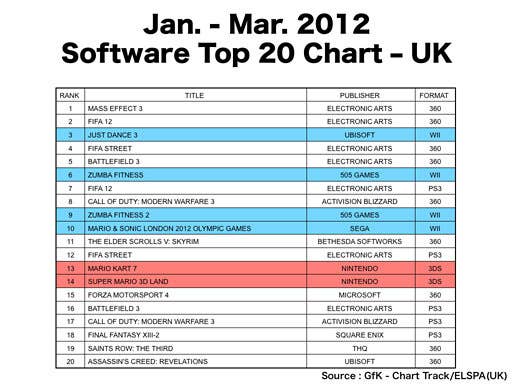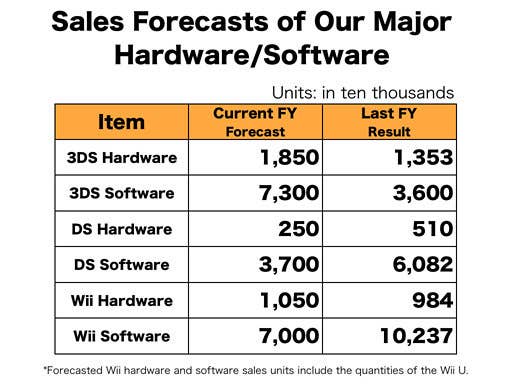2012: The World According to Nintendo
Iwata talks regional sales, Wii U predictions, selling hardware at a loss and digital downloads
Nintendo revealed its first full-year loss in company history yesterday, with the business $531 million in the red after a poor launch for the 3DS, declining Wii sales, a weak Christmas period and tough exchange rates due to the strong Yen.
Speaking in an investor presentation following the results, president Satoru Iwata offered his analysis of the current home and handheld video game market from Nintendo's perspective, looking at the key markets of Japan, the US and Europe, as well as addressing future strategies for 3DS, Wii U and digital growth.
Chart analysis

Japan is Nintendo's strongest market. Hardware units sales for the first quarter of the year have been impressive for the 3DS with only the PlayStation 3 a noticeable competitor. Sony's PS Vita by comparison looks in poor shape, being outsold in the handheld market by its predecessor the PSP.
"We believe this is a sign that the Nintendo 3DS has a strong presence in the market," noted Iwata. "On the other hand, since this year started, we have seen the Wii sales quickly losing momentum. In the home console market this year, Sony's PlayStation 3 remains in good shape," he added.
Of the top 20 software titles in Japan so far this year, 15 are for Nintendo systems, 13 of which are 3DS games and five of those first-party releases.
Over in the US the story is quite different, with Iwata acknowledging that Microsoft's Xbox 360 has maintained hardware sales momentum in 2012, although it does not seem to be due to sales of the Kinect peripheral.
"Some Kinect titles fared well in the chart towards the end of last year, but it seems that this momentum did not continue, so Kinect is probably not responsible for the Xbox 360's current sales growth," he said.
Kinect is probably not responsible for the Xbox 360's current sales growth
Satoru Iwata, Nintendo
There were eight Xbox 360 games in the top 20 best-sellers for 2012 according to NPD, compared to six from Sony and six from Nintendo. Iwata added that sales of the 3DS in the region are below expectations.
"Considering that the U.S. market is two or three times the size of its Japanese equivalent, I believe that the sales of the Nintendo 3DS in the U.S. are far below the level that it could potentially reach." There's also still a decent market for the original DS, according to Nintendo.

In Europe it's all change again, with Sony showing the strongest in terms of hardware sales according to Nintendo estimates. "Although the Nintendo 3DS has recently increased its weekly sales, it is far from a satisfactory level," he offered.
Breaking down European regions, Nintendo noted that of the top 20 best-selling titles in 2012, Nintendo claims ten hits in Germany, and nine each in Spain and France. There are six Nintendo titles in the UK charts, but "the UK market is virtually the only market in Europe where the Xbox 360 has a strong presence," according to Iwata. "In fact, it dominates the PlayStation 3, and it is in stark contrast to the other European markets."
Sales forecasts for 2012

Nintendo has said it expects to return to a profit in the current financial year, but disappointingly isn't yet breaking out sales of the original Wii and Wii U, due for sale before Christmas 2012. Instead it has combined sales in its forecasts, expecting 10.5 million combined Wii unit sales and 70 million combined Wii software sales.
"We think that the software sales of the Nintendo DS and the Wii will rather significantly decrease due to the small number of games scheduled in this fiscal year," said Iwata.
"We don't anticipate that the software sales of the Wii U can compensate for the decrease in those of the Wii because the Wii U will be launched as late as in the holiday season and then the total unit sales of the Wii U will be limited in this fiscal year. This is one of the reasons our business performance inevitably fluctuates when we change platforms."
Software sales forecasts for the Wii U and the 3DS include those to be downloaded via digital distribution but exclude Virtual Console software and download-only software.
Sales of the 3DS are expected to climb to 18.5 million with game sales of 73 million.
Selling at a loss
Speaking of the 3DS, Iwata quite simply stated that in the first half of the financial year Nintendo intends to "get out of the situation that we sell the hardware below cost," following last year's poor results. Software must remain evergreen said Iwata, rolling out a well-worn list of Nintendo franchises, before admitting that last year suffered with a large gap between 3DS releases "which delayed the beginning of the year-end sales season and we eventually missed our goal of the sales forecast."
Expanding the digital business
But the headline news from Nintendo's conference call was the reveal that it intends to release digital games at the same time as physical products, although solid details were thin on the ground.
Over 70 % of 3DS users in the US and Japan have connected to the internet compared to 50% in Europe
"The company will offer the software titles that Nintendo itself publishes in both packaged and digital download formats so that our consumers can choose the way to purchase them," offered Iwata.
He revealed that in Japan and the US over 70 per cent of 3DS users have connected to the internet, while in that figure is only 50 per cent in Europe and Australia, "which is not a satisfactory level yet."
Iwata said he wanted to continue to use traditional retail to sell digital content using codes purchased at physical or online stores, and noted a difficulty in exposing potential customers to digital content. "If only the consumers who proactively visit the Nintendo eShop are aware of the digital download software that we deploy, there is no chance that our digital business can drastically expand," he said.
"By asking our retailers to take part in selling our digital products as we propose, they can prevent the losses due to having excess inventory and prevent their business opportunities from being lost due to being out of stock," he concluded.

